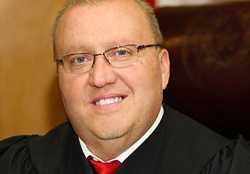 WILLIS, Texas — The attorney general of Texas has upheld the practice of a local justice of the peace who has been under fire from a professing atheist organization for allowing chaplains to deliver daily invocations in his courtroom.
WILLIS, Texas — The attorney general of Texas has upheld the practice of a local justice of the peace who has been under fire from a professing atheist organization for allowing chaplains to deliver daily invocations in his courtroom.
According to reports, Judge Wayne Mack of Willis opens each day with a ceremony that includes an invocation. The prayer is offered by a local chaplain, and the invocation is open to all religions.
But the Wisconsin-based Freedom From Religion Foundation (FFRF) says that it received two complaints in 2014 about the offering of Christian prayers: one from an attorney and another from a local citizen. It states that they felt coerced to participate out of fear of being disrespectful.
The organization then sent a letter to Mack, asserting that that the prayer practice is unlawful.
“It is a fundamental principle of Establishment Clause jurisprudence that the government may not in any way promote, advance or otherwise endorse religion,” it wrote. “[I]t would appear to any reasonable observer that the Montgomery County judicial system endorsing religion in general and Christianity in particular.”
FFRF also contended that praying in public is unbiblical.
“During the Sermon on the Mount, Jesus discourages public prayer,” it said, citing Matthew 6:5-6, where Jesus spoke against those who offer their prayers in a showy manner to be seen and praised by others.
“Any public prayer practice violates this biblical mandate and will offend those Christians who observe it,” FFRF wrote.
It also sent a complaint to the Texas State Commission on Judicial Conduct, which—along with Lt. Gov. Dan Patrick—then requested that Texas Attorney General Ken Paxton issue a formal opinion on the prayers in Mack’s courtroom.
Last week, Paxton upheld Mack’s prayer practice as being lawful and consistent with both American history and legal precedent. He pointed to the U.S. Supreme Court’s ruling in Town of Greece v. Galloway.
“In both instances, religious leaders of any faith are invited to deliver a prayer at the beginning of the proceedings,” Paxton wrote. “No guidance is given about the tone or content of the prayers. While the public officials themselves participate in the prayer, the public is not required to do so, and nothing suggests that non-participants are disadvantaged or disfavored due to their decision not to participate.”
“Furthermore, the court has acknowledged that the judiciary has a ‘long-established practice of prayer at public events,'” he noted. “Accordingly, we believe a justice of the peace’s practice of opening daily court proceedings with a prayer by a volunteer chaplain … is sufficiently similar to the U.S. Supreme Court’s decision in Galloway such that a court would likely be compelled to agree with Galloway that the long-standing tradition of opening a governmental proceeding with prayer does not violate the Establishment Clause.”
FFRF says that it is dissatisfied with Paxton’s determination.
“Contrary to Paxton’s ruling, chaplain-delivered prayers in the courtroom cannot be likened to so-called ‘ceremonial deism’ or justified as a natural extension of prayer by legislative bodies,” it wrote in a press release about the matter.
“The chaplains are part of a volunteer chaplain program in which religious leaders provide counsel to persons in distress. Such programs, legally questionable in their own right, typically do not intrude into the courtroom,” FFRF contended. “Ironically, the chaplain prayers themselves create distress to those present who in good conscience do not wish to participate in religious rituals.”
Become a Christian News Network Supporter...


